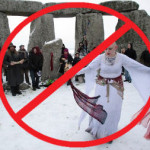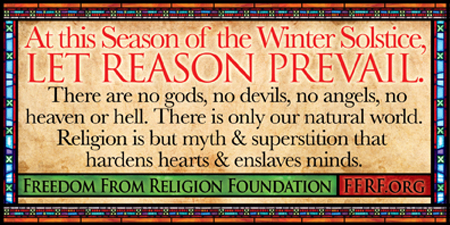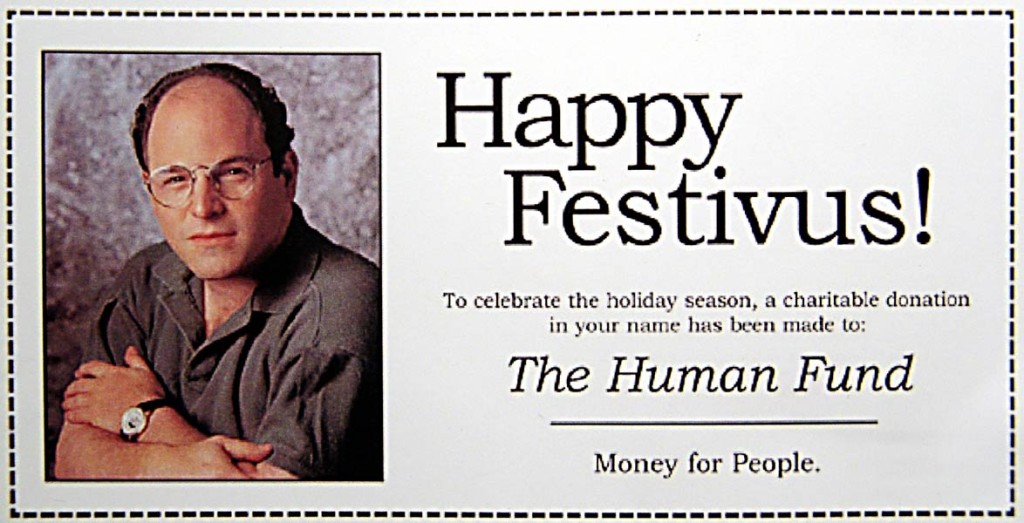The War on Solstice
 Christmas-time has long been a tricky spot for atheists, particularly for the activists and more politically-minded atheists. For my part, I do not partake. As a teenage atheist I was making a point of rejecting the whole Messiah-fest nature of the thing. I still mostly ignore the holiday, but my reasons have changed over the years. Having one ultra-mega consumerism-based holiday causes many problems we do not need to have. The seasonality of the economy is bad for everyone, reducing efficiency as stores and consumers switch to radically different modes, one for Black Friday+Christmas and one for every other day. many accrue enormous credit card debt that they wouldn’t if spending were paced more evenly through the year. And worst of all, the endlessly expanding extravagance of gifts and parties actually makes these days incredibly stressful for millions of people leading to higher depression and suicide rates. Christmas kills, if inadvertently so.
Christmas-time has long been a tricky spot for atheists, particularly for the activists and more politically-minded atheists. For my part, I do not partake. As a teenage atheist I was making a point of rejecting the whole Messiah-fest nature of the thing. I still mostly ignore the holiday, but my reasons have changed over the years. Having one ultra-mega consumerism-based holiday causes many problems we do not need to have. The seasonality of the economy is bad for everyone, reducing efficiency as stores and consumers switch to radically different modes, one for Black Friday+Christmas and one for every other day. many accrue enormous credit card debt that they wouldn’t if spending were paced more evenly through the year. And worst of all, the endlessly expanding extravagance of gifts and parties actually makes these days incredibly stressful for millions of people leading to higher depression and suicide rates. Christmas kills, if inadvertently so.
But whatever my reasons, I don’t fault people for enjoying it. I don’t hesitate to say “happy holidays” nor am I incensed to hear “Merry Christmas!”. But I will be the first to instigate a war on the Solstice. The Winter Solstice can be defeated in our lifetime.
Reason for the Season?
Activist groups like American Atheists have pushed for atheists to embrace the winter solstice as it’s own December-time festival, correctly citing the solstice as the reason for many celebrations in ancient societies taking place mid-December. The astronomical fact of the cessation of the lengthening of night was taken to have mystical or religious rebirth and recycle significance. The ancient Roman celebration of Saturnalia, the festival of lights ending on the solstice, is such an event. Setting aside the tawdry Me Too-ism of fabricating a holiday sheerly for the sake of secular social status in December (See also, Kwanzaa, Hanukkah), the “solstice is the reason for the season” does not withstand scrutiny. This is true even if we take “reason” to mean “origin” rather than purpose.

The Trouble with Christmas
Tom Flynn, author and executive director of the Council for Secular Humanism, wrote a book about the various problems with the holiday called The Trouble with Christmas. In the presentation below, Flynn recounts how Puritans outlawed Christmas and later that between 1790 and 1820, the holiday simply faded away across the entire English-speaking world. Christmas as we know it was invented by, according to Flynn, 6 prominent victorians. For example,
- The first detailed depiction & description of what we call Santa Claus was from Washington Irving’s A History of New York. The book is satirical history written in absurd exaggeration, but later taken to be serious.
- Charles Dickens created a fictional nostalgic Christmas holiday that never existed; His Scrooge character helped acceptance along by ridiculing nonconformers as heartless misers.
- Queen Victoria took a liking to the Germanic Tannenbaum tradition and virtually single-handedly attached it to the emerging Anglo-American Christmas holiday. Again, no previous tradition with a tree had ever been related to Christmas. The folk poem “O Tannenbaum” written in 1824 made no mention at all of Christmas and “tannenbaum” is merely German for “fir tree”.
- Clement C. Moore, credited with writing “The Night Before Christmas” (1823). It used much of Irving’s Santa description and simply made up the rest.
There’s more, but you get the idea (watch his presentation below). What does any of these Victorian inventions have to do with the Solstice? Nothing, really. The selection of date for convenience? Sure but that’s hardly all that important compared to the values and traditions which they fabricated from virtually nothing. There was no cultural continuity. No culture on Earth made Christmas a significant holiday for decades before the revival efforts. The significance of the solstice changes nothing of that.
http://vimeo.com/30871923
Plastic Culture
Holidays are all manufactured contrivances which can bend and change with every new generation. There’s nothing wrong with that, either. But we don’t need to imagine some ancient original meaning is somehow the “true” meaning, this is to commit the genetic fallacy. Most people who celebrate Halloween know nothing about the origin of that holiday. It would be patently silly to suggest that the meaning people do not know is somehow the “true” meaning of the day.
If holidays are relatively arbitrary and plastic in time, does it then make sense for atheists to take up the solstice? Definitely not. The meaning to the ancients was largely religious or mystical. This is hardly the stuff of secularist celebration. Even the modern “axial tilt is science!” stuff just seems forced and silly. I simply do not care about the solstice, it has no meaning to me and inventing one just to culturally compete with Christmas is dishonest and attempts to homogenize secularist identity as a variant of “normal” and therefore acceptable Judeo-Christian culture.
Festivus Yes! Bagels & Solstice No!
On the other hand, I do dig Festivus. It’s contrived and modern, but that’s why it succeeds as a subversive: so is Christmas and what passes for Solstice. Festivus’s message of rebellion against the vicissitudes and psychological torment of Christmas is timely and meaningful. And, although it was popularized by the fictional sitcom Seinfeld, it was written based on the true story of writer Dan O’Keefe’s family tradition.  Like Christmas, Festivus was originally some other date, and normalized to late December at the whim of a ruler (in our case, Jerry Seinfeld and Larry David). Of all the options (Christmas, abstaining, Solstice, “HumanLight” ugh) it has the fewest demerits and the most virtues, not the least of which is that it doesn’t offend an atheist’s dignity or intelligence. Also, I’d appreciate a day that calls for the airing of grievances. I got a lot of problems with you people!
Like Christmas, Festivus was originally some other date, and normalized to late December at the whim of a ruler (in our case, Jerry Seinfeld and Larry David). Of all the options (Christmas, abstaining, Solstice, “HumanLight” ugh) it has the fewest demerits and the most virtues, not the least of which is that it doesn’t offend an atheist’s dignity or intelligence. Also, I’d appreciate a day that calls for the airing of grievances. I got a lot of problems with you people!
